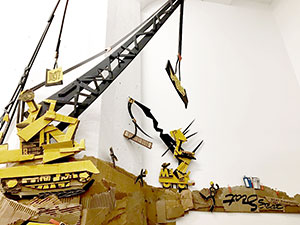 *
*
Pier Gustafson writes on his website, “My studio in the real world is rather like the studio here in the virtual world – a bit on the busy side with lots of things going on. I may be researching a map in this corner, painting a sign-in board in that. My drawing table may be covered with sketches for a monogram which must be moved to make way for a stack of envelopes which need to be addressed.”
 I caught up with Gustafson, to talk a bit about his work, and the new pieces he is working on.
I caught up with Gustafson, to talk a bit about his work, and the new pieces he is working on.
Doug Holder: You are one of the original residents of the Brickbottom artist space in Somerville. Could you describe the sensibility of the artist/residents – a reason they might fit in the milieu of our burg?
Pier Gustafson: I am one of the original members of this community and have enjoyed living in this building as well as being a part of Somerville at large. I must admit that I don’t travel too often towards the western half of Somerville but have enjoyed the diversity of land use and population of this more industrial corner.
DH: You are known as a graphic artist, illustrator and calligrapher. But also, you are now working with found art, specifically concerning the detritus of the Greenline Extension Project, right near your digs. How did the germ of the idea come about for you? Tell us about some of the things you constructed.
PG: I am using discarded recycled cardboard and the printed graphics to depict much of the construction scene I see outside my window and around this neighborhood. The subject matter might be the building of the Green Line, but the materials are more domestic. Liquor, Amazon, grocery and shoeboxes that I find in our recycling rooms have been the raw materials. The germ sparked when I found a bright yellow Dewalt tool box in the bin. It matched the colors of the bulldozers and cranes used in the GLX construction. I had done many drawings of the scene, but that box started my “Tonka-toy-like” constructions.
DH: What are your feelings about the construction? Do you feel Brickbottom will be changed by it?
PG: Most everyone hates the noise of the construction. I am not bothered by it. I think once the sound walls go up, we’ll find the noise will seem better than the “penned in” feeling we might get once completed. I don’t think we will change much because of the finished product, as our immediate area is developed with an actual building. We may feel a little different.
DH: When a writer confronts a blank piece of paper he often brainstorms – a stream of consciousness goes on. How do you approach the blank piece of paper?
PG: Blank paper scares me to death, but a paper that has a mark on it can inspire. The boxes in the construction work have graphics that make me think in a certain way. I love making a work of art to fit a found frame or grabbing two random art tools and letting the random colors direct my thoughts and creativity.
DH: You do a lot of commercial work, but your art is also found in museums, galleries, etc. What’s the line between commercial art and art – or is there no line? Do they all flow from the same stream?
PG: I think both fine and commercial art are two banks of the same stream. The commercial end has another person “helping” me create something for their needs. More of a collaboration. But I find it challenging and fun, and I usually get paid in advance! Making art all by myself can be a bit lonely and never be appreciated – or bought. Both banks work for me though.
DH: Why should people buy or view your art?
PG: Most people that see my work smile. If someone hasn’t yet seen it I think they should, and I think they will smile, too. If they want to smile often, they may buy it, and take it with them. These days much of my creative endeavors is creating things digitally. I post them on Instagram and Facebook and get lots of exposure from people far afield. They see the original on their device for free. If I get a little heart from them, that makes me smile a bit, too.















Reader Comments